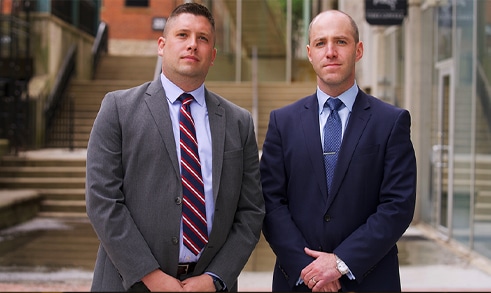
Columbus Probation and Parole Violation Lawyers
Experienced Ohio criminal defense lawyers helping clients accused of violating parole or probation
Defendants who violate their probation or parole can be sentenced (or sent back) to prison. At Soroka & Associates, LLC, we fight to ensure that does not happen to you. Our Columbus probation and parole lawyers fight to show defendants didn’t violate the terms of their release and represent the defendants in any related cases. Contact us today for help.
How can we help?

What is probation?
Judges are generally required to sentence defendants based on the type of offense committed, the defendant’s prior record, and many other factors. For serious crimes or repeat offenses, a judge can order a prison or jail sentence. In cases where the crime is less serious, a first offense, or where a judge thinks that community sanctions are a better alternative, a judge can order that a defendant be sentenced to probation or to a short prison sentence of a definite length followed by release on probation.
Judges who order probation normally require that the defendant complies with certain conditions such as not committing any other crimes and reporting to a probation officer. Common conditions include:
- Complying with all Ohio and federal laws
- Meeting with a probation officer
- Paying all fines, fees, and court-order restitution
- Performing some community service such as cleaning up local parks
- Not using drugs or alcohol – and agreeing to take tests to verify a defendant is clean and sober
- Seeking employment
- Attending school or acquiring trade skills
What conduct violates probation in Columbus?
In Ohio, a defendant can be arrested, if the peace officer has reasonable grounds to believe a violation occurred, for violating any of the following probation conditions/community control sanctions:
- “A condition that prohibits ownership, possession, or use of a firearm, deadly weapon, ammunition, or dangerous ordnance.
- A condition that prohibits the person from being within a specified structure or geographic area.
- A condition that confines the person to a residence, facility, or other structure.
- A condition that prohibits the person from contacting or communicating with any specified individual.
- A condition that prohibits the person from associating with a specified individual.”
Violations also include failing or refusing to submit to a random drug test and other statutory or sentencing conditions. Any defendant who is charged with another crime could also be charged with a violation of probation.
What happens if a defendant violates probation in Columbus?
Defendants have the right to due process if they are charged with violating probation. Our Columbus probation violation lawyers defend Columbus defendants who are charged with probation violations by asserting that you did not violate probation, that any violation was unintentional, or that any violation was minor.
Generally, judges can find that you did not violate probation, that you did violate probation and that your period of probation should be extended, or revoke your probation and sentence you to prison or jail.
What is parole?
Parole is different than probation. Parole occurs after the judge has sentenced a defendant to prison/jail and the defendant has served some of his/her incarceration sentence. In Ohio, an adult parole authority determines whether a defendant is eligible for parole.
The Ohio Adult Parole Authority is comprised of the Parole Board and Field Services. The APA:
Determines release of inmates from prison to parole or transitional control, sets supervision conditions for inmates released on post release control, coordinates placement of offenders in the community and supervises them upon their release from prison. The APA Field Services section is comprised of Fugitive, Interstate Compact, and the Parole Regions.
Parole is generally given as a reward for good behavior while in prison. Some of the conditions of parole include:
- Enrollment in a halfway house
- Seeking employment
- Meeting with a parole officer
- Enrolling in a substance abuse (drug or alcohol) program
- Community service
- Not registering as a sex offender if required to do so
- Other conditions
Possible supervision arrangements for parole in Ohio include:
- Post-Release Control (PRC). This includes community supervision following release from prison.
- Community Corrections (CC). These are non-prison sanctions.
- Judicial release (JUR). This is “the release of someone who is incarcerated through an order by a court.” The judge can order supervision of the defendant for up to five years.
- Treatment in Lieu of Conviction (TIL). Here, those defendants who are eligible can complete court-ordered treatment programs instead of being placed in prison – provided the offense was due to alcohol abuse, drug abuse, mental illness, or intellectual disability.
- Transitional Control (TC). Per the Ohio Department of Rehabilitation & Correction (ODRC), “the Division of Parole and Community Services to transfer eligible inmates to transitional control status for the purpose of closely monitoring the inmate’s adjustment to community supervision during the final 180 days of an inmate’s sentence.” This may involve placement in a licensed facility or in an approved residence.
- Treatment Transfer (TT). This is for Level 4 and 5 non-violent offenders. Here, “Eligible inmates may be transferred from state correctional facilities to the community facilities [such as a halfway house or approved residence] for up 365 days prior to the expiration of prison sentence.” Electronic monitoring may be required.
- Judicial parole. Inmates may be eligible for release (subject to certain conditions) after serving 80% of their sentence.
Parole may also include Compact parole, which applies to defendants who are transferred from another state.
What conduct violates parole in Columbus?
Generally, a parole violation occurs when a parolee commits another crime or fails to comply with any parole release terms. Parolees do have the right to legal representation if they are charged with a parole violation. Parole violations are heard by the ODRC.
What happens if a defendant violates parole in Columbus?
The ODRC can find that the defendant didn’t violate parole, should be assigned additional community sanctions, placed in a work-release center or other non-prison facility, or returned to prison. Parole violations are generally decided on a “preponderance of the evidence” standard and not a “reasonable doubt” standard.
Do you have a probation/parole defense lawyer near me?
The Columbus office of Soroka & Associates is located at 503 South Front Street, Suite 205. Our office is near I-71 and Rt. 23. We do meet probation and probation violation defendants in prison if necessary.
Talk to a strong Columbus probation and parole lawyer now
If you’ve been arrested for a probation or parole violation, your liberty is at stake. You do have rights. You can assert that no violation occurred, or that the violation was minor. Our lawyers assert all your defenses. We also discuss whether your current probation or parole terms can be extended – rather than being ordered to prison. Call us at 614-918-4078 or complete our contact form to schedule a free consultation.
